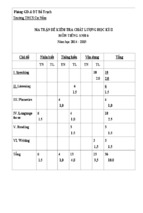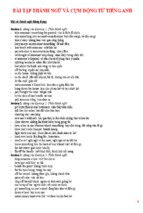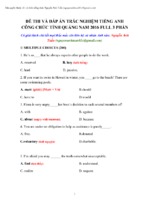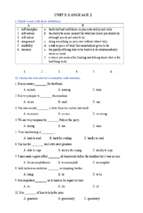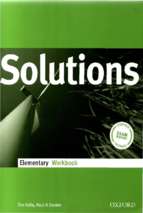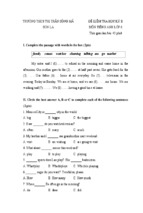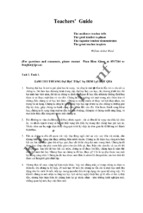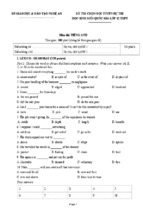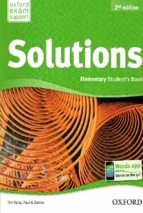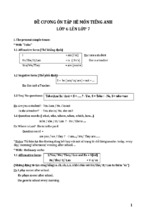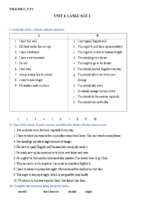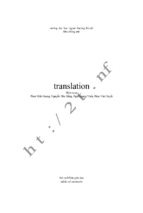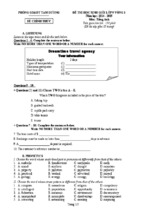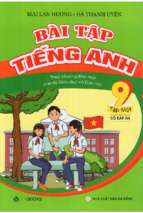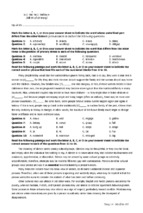Mô tả:
Bao gồm bài tập unit 4: Caring for those in need của sách Tiếng Anh 11 mới (có đáp án). Bài tập gồm tất cả các dạng từ dễ đến khó, có cả trắc nghiệm và viết lại câu, bao gồm cả bài đọc và bài viết Grammar: the past simple and the present perfect Writing: Write an article about problems facing disabled people and how they can be solved.
UNIT 4: LANGUAGE 2
I. Choose the suitable word to complete the sentence.
1. Last week we interviewed some volunteers who had worked with disabled/disabilities students.
2. There are more devices to enable people with impairments/physical disabilities to travel
around.
3. These are students with various visual, hearing/deaf, physical and cognitive impairments.
4. We need to help disabled students to become independent and integrate/launch in the
community.
5. The students in our class has charity/donated more than 50 gifts.
II. Complete the sentences using the given words.
impairments
volunteers
voluntary
visual
support
1. People with physical ……………………………… have difficulty climbing stairs.
2. This special school helps students with ……………………………… impairments to learn
Braille.
3. Many ……………………………… took part in our programmes since the campaign was
launched.
4. We have launched various services to ……………………………… people with learning
disabilities.
5. We completed a ……………………………… project for our community center a month ago.
III. Find the word which is different from the other in the position of primary stress.
1.
A. wheelchair
B. vocational
C. support
D. rewarding
2.
A. promote
B. pedestrian
C. mobility
D. limitation
3.
A. millennium
B. involve
C. ingredient
D. hardship
4.
A. ingredient
B. extracurricular
C. discrimination
D. coordination
5.
A. hardship
B. accessible
C. fracture
D. wheelchair
IV. Complete the second sentence so that it has the same meaning as the first one.
1. The company last won a trophy 20 years ago.
The company hasn't won a trophy …………………………………...
2. The club has been successful for three years.
The club started to be successful…………………………………...
3. The team last won a home game in September.
The team hasn't won a home game …………………………………...
4. Peter hasn't scored a goal for 2 months.
Peter last scored a goal…………………………………...
5. The club started to play in this stadium in 2010.
The club has played in this stadium…………………………………...
6. She became the marketing manager 4 months ago.
She has been the marketing manager …………………………………...
7. Lien last visited a centre for children with cognitive impairments two weeks ago.
Lien hasn't visted a centre for children with cognitive
impairments …………………………………...
8. His sister got injured three weeks ago, and she's still in hospital now.
His sister has been injured …………………………………...
UNIT 4: LANGUAGE 2 – KEYS
I. Choose the suitable word to complete the sentence.
1. Last week we interviewed some volunteers who had worked with disabled/disabilities students.
2. There are more devices to enable people with impairments/physical disabilities to travel around.
3. These are students with various visual, hearing/deaf, physical and cognitive impairments.
4. We need to help disabled students to become independent and integrate/launch in the
community.
5. The students in our class has charity/donated more than 50 gifts.
II. Complete the sentences using the given words.
impairments
volunteers
1. People with physical …………… impairments
voluntary
visual
support
………………… have difficulty climbing
stairs.
2. This special school helps students with …………… visual ………………… impairments to
learn Braille.
3. Many ………… volunteers …………………… took part in our programmes since the campaign
was launched.
4. We have launched various services to …………… support………………… people with
learning disabilities.
5. We completed a …………… voluntary ………………… project for our community center a
month ago.
III. Find the word which is different from the other in the position of primary stress.
1.
A. wheelchair
B. vocational
C. support
D. rewarding
2.
A. promote
B. pedestrian
C. mobility
D. limitation
3.
A. millennium
B. involve
C. ingredient
D. hardship
4.
A. ingredient
B. extracurricular
C. discrimination
D. coordination
5.
A. hardship
B. accessible
C. fracture
D. wheelchair
IV. Complete the second sentence so that it has the same meaning as the first one.
1. The company last won a trophy 20 years ago.
The company hasn't won a trophy for 20 years/ for twenty years
2. The club has been successful for three years.
The club started to be successful three years ago/ 3 years ago.
3. The team last won a home game in September.
The team hasn't won a home game since September.
4. Peter hasn't scored a goal for 2 months.
Peter last scored a goal two months ago/ 2 months ago
5. The club started to play in this stadium in 2010.
The club has played in this stadium since 2010.
6. She became the marketing manager 4 months ago.
She has been the marketing manager for four months/ for 4 months
7. Lien last visited a centre for children with cognitive impairments two weeks ago.
Lien hasn't visted a centre for children with cognitive impairments for two weeks/ for 2 weeks
8. His sister got injured three weeks ago, and she's still in hospital now.
His sister has been injured for three weeks/ for 3 weeks
UNIT 4: READING 2
Read the text and do the tasks follow.
HELP YOUR COMMUNITY
Trang, Peter and Mary are three energetic volunteers at Green Heart, an organization
aiming at helping people with disabilities. We have interviewed them about
unforgettable moments that they had when participating in programmes or projects for
the disabled. Here are their responses.
Trang
'I developed my passion for doing charity after my first trip to a special centre for
impaired children. The centre takes care of kids with mental and physical disabilities
and tries to prepare them for an independent life by the time they reach eighteen. At
first, I didn't know how I would behave around mentally disabled children, but I went
into it with a positive outlook. Almost instantly, I fell in love with the kids. They were
all so hilarious that just being around them made you feel so happy. I enjoy every
moment playing with them, and I hope I can give them more support.'
Peter
'My group and I are joining a project called 'Four-leaf clovers'. We connect sponsors
and benefactors with children who have mobility impairments but are very talented so
that they can succeed later in their lives. We also bring those children hope by
organizing a number of events where they can integrate into the community and gain
confidence to show off their talents. This Mid-Autumn Festival, some international
volunteers and I organized a meaningful festival for disabled children at Phuc Tue
Centre. We made mooncakes, gave children star lanterns and cute masks and also held
a colourful parade that night. We couldn't help laughing when we saw them shouting
aloud happily.'
Mary
'Well, my experience at centres for children with impairments is one of the most
precious memories in my life. I enjoy teaching those children English and feel pleased
to hear them sing English songs along with me. Those little angles are so wonderful
that every time I'm down, I think of them to lift my spirits. I still remember a gorgeous
girl that I met at Ba Vi Orphanage. Though she is visually impaired, she is determined
to become an English teacher who can help other people with impairments like her. She
makes great attempts to study English time after time, and finally her endeavour bears
fruit. She is now teaching English at Ba Vi Orphanage. What makes her work
admirable is that she always tries to inspire children and get them involved in her fun
and creative learning activities.'
I. Write T (for Trang), P (for Peter) or M (for Mary) next to the corresponding
information they provide in the passage. Only ONE letter for each blank.
1.
thinks of children with impairments whenever he/she feels depressed.
2.
didn't know how to act around children with mental disabilities at first.
3.
is currently working on a project.
4.
went to a home for children whose parents are dead.
5.
did voluntary work with foreigners.
II. Fill in each gap with NO MORE THAN TWO WORDS from the passage.
1. Trang had passion for helping people in need after her visit to a special centre for
…………………………………...
2. The centre where Trang went to prepares mentally and physically handicapped
kids for an …………………………………... future.
3. Peter and his group give talented children with …………………………………... a
hand by connecting them with sponsors and benefactors.
4. Peter helped made a …………………………………... Mid-Autumn festival for
children with disabilities at Phuc Tue Centre.
5. Mary told us about a visually impaired girl who made her dream of being
an …………………………………... come true.
UNIT 4: READING 2 – KEYS
Read the text and do the tasks follow.
HELP YOUR COMMUNITY
Trang, Peter and Mary are three energetic volunteers at Green Heart, an organization
aiming at helping people with disabilities. We have interviewed them about
unforgettable moments that they had when participating in programmes or projects for
the disabled. Here are their responses.
Trang
'I developed my passion for doing charity after my first trip to a special centre for
impaired children. The centre takes care of kids with mental and physical disabilities
and tries to prepare them for an independent life by the time they reach eighteen. At
first, I didn't know how I would behave around mentally disabled children, but I went
into it with a positive outlook. Almost instantly, I fell in love with the kids. They were
all so hilarious that just being around them made you feel so happy. I enjoy every
moment playing with them, and I hope I can give them more support.'
Peter
'My group and I are joining a project called 'Four-leaf clovers'. We connect sponsors
and benefactors with children who have mobility impairments but are very talented so
that they can succeed later in their lives. We also bring those children hope by
organizing a number of events where they can integrate into the community and gain
confidence to show off their talents. This Mid-Autumn Festival, some international
volunteers and I organized a meaningful festival for disabled children at Phuc Tue
Centre. We made mooncakes, gave children star lanterns and cute masks and also held
a colourful parade that night. We couldn't help laughing when we saw them shouting
aloud happily.'
Mary
'Well, my experience at centres for children with impairments is one of the most
precious memories in my life. I enjoy teaching those children English and feel pleased
to hear them sing English songs along with me. Those little angles are so wonderful
that every time I'm down, I think of them to lift my spirits. I still remember a gorgeous
girl that I met at Ba Vi Orphanage. Though she is visually impaired, she is determined
to become an English teacher who can help other people with impairments like her. She
makes great attempts to study English time after time, and finally her endeavour bears
fruit. She is now teaching English at Ba Vi Orphanage. What makes her work
admirable is that she always tries to inspire children and get them involved in her fun
and creative learning activities.'
I. Write T (for Trang), P (for Peter) or M (for Mary) next to the corresponding
information they provide in the passage. Only ONE letter for each blank.
1. …………M………………thinks of children with impairments whenever he/she
feels depressed.
2. …………T………………didn't know how to act around children with mental
disabilities at first.
3. …………P………………is currently working on a project.
4. …………M………………went to a home for children whose parents are dead.
5. …………P………………did voluntary work with foreigners.
II. Fill in each gap with NO MORE THAN TWO WORDS from the passage.
1. Trang had passion for helping people in need after her visit to a special centre for
……impaired children/ disabled chilren…...
2. The centre where Trang went to prepares mentally and physically handicapped
kids for an ………independent……... future.
3. Peter and his group give talented children with ………mobility impairments…... a
hand by connecting them with sponsors and benefactors.
4. Peter helped made a ……meaningful/ colourful…... Mid-Autumn festival for
children with disabilities at Phuc Tue Centre.
5. Mary told us about a visually impaired girl who made her dream of being
an ……English teacher…... come true.
UNIT 4: LOOKING BACK AND PROJECT 2
I. Match the word with its definition.
A
1. Vocational
B
a. a person walking in the street and not travelling in a
school
2. Support
vehicle
b. a school that teaches skills that are necessary for
particular jobs
3. Pedestrian
c. the ability to move easily from one place to another
4. Mobility
d. to help or encourage somebody/something
5. Limitation
e. a break in a bone or other hard material
6. Involve
f. a rule, fact or condition that limits something
7. Fracture
g. to make somebody take part in something
II. Choose the suitable word to complete each sentence.
1. Last year I volunteered to teach at a school for people with hearing impairments
and launched/have launched a campaign to help them.
2. A: How many times did you try/have you tried to pass your driving test?
B: Three times so far.
3. A: I can't send my e-mails because my computer's broken.
B: How long was your computer/has your computer been broken?
A: About a week. I'm going to take it back to the shop when I have time.
4. A: I went to Japan on holiday last year.
B: How long was you/have you been there?
A: Only two weeks. It wasn't really long enough to see everything.
5. A: When did he arrive/has he arrived?
B: He arrived at 2 o'clock.
6. A: Why don't you want to play football with us this weekend?
B: I broke/have broken my leg.
7. A: I never drank/have never drunk whiskey.
B: Have some now.
8. My best friend, Linh went to Canana two years ago, but I wasn't/haven't
been there so far.
III. Fill in each gap with the past simple or the present perfect form of the given
word(s).
1. Last night I (lose) …………………….……………………. my keys. I had to call
my flatmate to let me in.
2. I (lose) …………………….……………………. my keys. Can you help me look
for them?
3. He (live) …………………….……………………. with his great grandmother for
a few years - she died when he was eight.
4. She and her best friends (know) …………………….……………………. each
other for over fifteen years. They still get together once a week.
5. A: What's wrong?
B: I (break) …………………….……………………. a glass.
6. She (be) …………………….……………………. a teacher for ten years, and she
still enjoys it.
7. How many times (she/ go) …………………….……………………. to the cinema
last month?
8. Aunt to Jonny: Jonny, I can't believe how much you've changed since the last time
I saw you. You (grow) …………………….……………………. at least a foot!
9. A: How long (you/ live) …………………….……………………. in Paris?
B: Twenty years. We came back to live in England in 2010.
10. A: How long (you/ live) …………………….……………………. in Japan?
B: Four years. And we really like it here.
UNIT 4: LOOKING BACK AND PROJECT 2 – KEYS
I. Match the word with its definition.
A
B
8. Vocational school
h. a person walking in the street and not travelling in a vehicle
9. Support
i. a school that teaches skills that are necessary for particular
jobs
1. a
10. Pedestrian
j. the ability to move easily from one place to another
11. Mobility
k. to help or encourage somebody/something
12. Limitation
l. a break in a bone or other hard material
13. Involve
m. a rule, fact or condition that limits something
14. Fracture
n. to make somebody take part in something
2. d
3. a
4. c
5. f
6. g
7. a
II. Choose the suitable word to complete each sentence.
1. Last year I volunteered to teach at a school for people with hearing impairments
and launched/have launched a campaign to help them.
2. A: How many times did you try/have you tried to pass your driving test?
B: Three times so far.
3. A: I can't send my e-mails because my computer's broken.
B: How long was your computer/has your computer been broken?
A: About a week. I'm going to take it back to the shop when I have time.
4. A: I went to Japan on holiday last year.
B: How long was you/have you been there?
A: Only two weeks. It wasn't really long enough to see everything.
5. A: When did he arrive/has he arrived?
B: He arrived at 2 o'clock.
6. A: Why don't you want to play football with us this weekend?
B: I broke/have broken my leg.
7. A: I never drank/have never drunk whiskey.
B: Have some now.
8. My best friend, Linh went to Canana two years ago, but I wasn't/haven't been there so far.
III. Fill in each gap with the past simple or the present perfect form of the given word(s).
1. Last night I (lose) ………lost…………. my keys. I had to call my flatmate to let me in.
2. I (lose) ……have lost………. my keys. Can you help me look for them?
3. He (live) …………lived………. with his great grandmother for a few years - she died when he
was eight.
4. She and her best friends (know) ………have known………. each other for over fifteen years.
They still get together once a week.
5. A: What's wrong?
B: I (break) ………have broken………. a glass.
6. She (be) …………has been………. a teacher for ten years, and she still enjoys it.
7. How many times (she/ go) …………did she go………. to the cinema last month?
8. Aunt to Jonny: Jonny, I can't believe how much you've changed since the last time I saw you.
You (grow) ……have grown………. at least a foot!
9. A: How long (you/ live) ………did you live……. in Paris?
B: Twenty years. We came back to live in England in 2010.
10. A: How long (you/ live) …………………….……………………. in Japan?
B: Four years. And we really like it here.
- Xem thêm -

